Related Research Articles
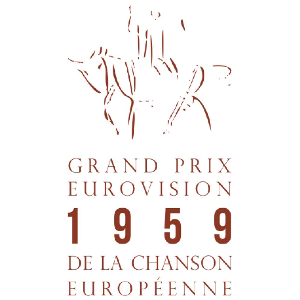
The Eurovision Song Contest 1959 was the fourth edition of the annual Eurovision Song Contest, held on Wednesday 11 March 1959 at the Palais des Festivals et des Congrès in Cannes, France, and hosted by French television presenter Jacqueline Joubert. Organised by the European Broadcasting Union (EBU) and host broadcaster Radiodiffusion-Télévision Française (RTF), the contest, originally known as the Grand Prix Eurovision de la Chanson Européenne 1959, was held in France following the country's victory at the 1958 contest with the song "Dors, mon amour", performed by André Claveau.

Sergei Fyodorovich Bondarchuk was a Soviet and Russian actor and filmmaker of Ukrainian origin, who was one of the leading figures of Russian cinema in the 1950s, 1960s and 1970s. He is known for his sweeping period dramas, including War and Peace (1965–67), his internationally acclaimed four-part film adaptation of Leo Tolstoy's novel, and for Waterloo (1970) a Napoleonic War epic.
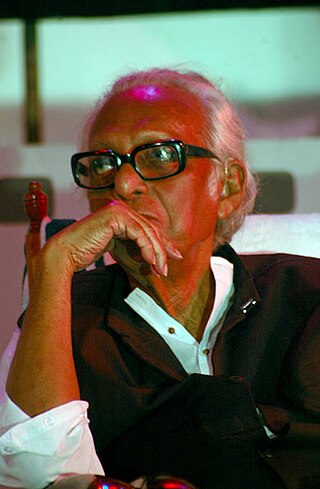
Mrinal Sen was an Indian film director and screenwriter known for his work primarily in Bengali, and a few Hindi and Telugu language films. Regarded as one of the finest Indian filmmakers, along with his contemporaries Satyajit Ray, Ritwik Ghatak, and Tapan Sinha, Sen played a major role in the New Wave cinema of eastern India.
Bimal Roy was an Indian film director. He is particularly noted for his realistic and socialistic films such as Do Bigha Zamin, Parineeta, Biraj Bahu, Devdas, Madhumati, Sujata, Parakh and Bandini, making him an important director of Hindi cinema. Inspired by Italian neo-realistic cinema, he made Do Bigha Zamin after watching Vittorio De Sica's Bicycle Thieves (1948). His work is particularly known for his mise en scène which he employed to portray realism. He won a number of awards throughout his career, including eleven Filmfare Awards, two National Film Awards, and the International Prize of the Cannes Film Festival. Madhumati won 9 Filmfare Awards in 1958, a record held for 37 years.

Károly Makk was a Hungarian film director and screenwriter. Five of his films were nominated for the Palme d'Or at the Cannes Film Festival; however, he won lesser awards at Cannes and elsewhere. He was born in Berettyóújfalu, Hungary.

Konrad Wolf was an East German film director. He was the son of writer, doctor and diplomat Friedrich Wolf, and the younger brother of Stasi spymaster Markus Wolf. "Koni" was his nickname.

Cinema of the Netherlands refers to the film industry based in the Netherlands. Because the Dutch film industry is relatively small, and there is little or no international market for Dutch films, almost all films rely on state funding. This funding can be achieved through several sources, for instance through the Netherlands Film Fund or the public broadcast networks. In recent years the Dutch Government has established several tax shelters for private investments in Dutch films.
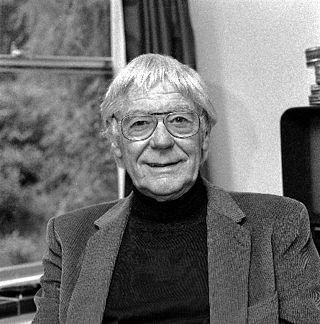
Albert Haanstra was a Dutch director of films and documentaries. His documentary Glass (1958) won the Academy Award for Documentary Short Subject in 1959. His feature film Fanfare (1958) was the most visited Dutch film at the time, and has since only been surpassed by Turkish Delight (1973).

Christian-Jaque was a French filmmaker. From 1954 to 1959, he was married to actress Martine Carol, who starred in several of his films, including Lucrèce Borgia (1953), Madame du Barry (1954), and Nana (1955). In 1961 he married Laurence Christol

Daniel Tinayre was a French-born Argentine film director, screenwriter and film producer.

Sergei Iosifovich Yutkevich was a Soviet film director and screenwriter. He was a People's Artist of the USSR (1962) and a Hero of Socialist Labour (1974).
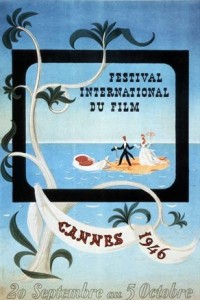
The 1st annual Cannes Film Festival was held from 20 September to 5 October 1946. Twenty-one countries presented their films at the "First Cannes International Film Festival", which took place at the former Casino of Cannes. Only one year after the end of World War II, most of the films were about the war. There arose several technical issues, such as the tarpauline cover blowing away in a storm on the day before the winners were to be announced, the reels of Alfred Hitchcock’s Notorious shown in reverse order, and Miguel M. Delgado’s The Three Musketeers projected upside-down.

The 12th Cannes Film Festival was held from 30 April to 15 May 1959. The Palme d'Or went to the Orfeu Negro by Marcel Camus. The festival opened with Les Quatre Cents Coups, directed by François Truffaut and closed with The Diary of Anne Frank, directed by George Stevens.
Kurt Hoffmann was a German film director, the son of Carl Hoffmann. He directed 48 films between 1938 and 1971. He ran a production company Independent Film along with Heinz Angermeyer.
Nikola Korabov was a Bulgarian film director and screenwriter. He directed thirteen films between 1956 and 1999. His 1962 film Tyutyun was entered into the 1963 Cannes Film Festival. His 1965 film Bull was entered into the 4th Moscow International Film Festival. His 1971 film Wrathful Journey was entered into the 7th Moscow International Film Festival. He died on 10 November 2016.

Jos Stelling is a Dutch film director and screenwriter.

András Kovács was a Hungarian film director and screenwriter. He directed 30 films between 1961 and 1996. His 1968 film The Lost Generation was entered into the 6th Moscow International Film Festival. His 1978 film A ménesgazda was entered into the 29th Berlin International Film Festival. His 1981 film Temporary Paradise won the Silver Prize at the 12th Moscow International Film Festival. His 1985 film The Red Countess was entered into the 14th Moscow International Film Festival.

The Day Shall Dawn is a 1959 Pakistani Bengali drama film directed by A. J. Kardar. The film was selected as the Pakistani entry for the Best Foreign Language Film at the 32nd Academy Awards, but was not accepted as a nominee. It was also entered into the 1st Moscow International Film Festival where it won a Golden Medal. The film was featured in British Film Institute's 2002 critics' poll of "Top ten Pakistani films of all times".

Leonard Buczkowski was a Polish film director and screenwriter. He directed 23 films between 1928 and 1966. His 1959 film The Eagle was entered into the 1st Moscow International Film Festival.
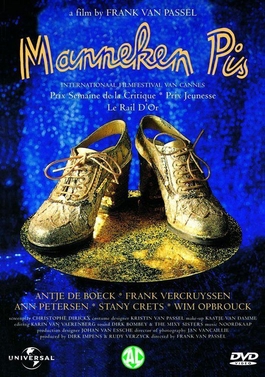
Manneken Pis is a 1995 Belgian comedy-drama film directed by Frank Van Passel and written by Christophe Dirickx. It premiered in May 1995 at the Cannes Film Festival. It received the André Cavens Award for Best Film and four awards at the Joseph Plateau Awards. The film was selected as the Belgian entry for the Best Foreign Language Film at the 68th Academy Awards, but was not accepted as a nominee.
References
- 1 2 "Top 20 Dutch Features, 1945-1989". Variety . 29 October 1990. p. 46.
- ↑ "Festival de Cannes: Fanfare". festival-cannes.com. Archived from the original on 15 September 2012. Retrieved 14 February 2009.
- ↑ "1st Moscow International Film Festival (1959)". MIFF. Archived from the original on 16 January 2013. Retrieved 27 October 2012.